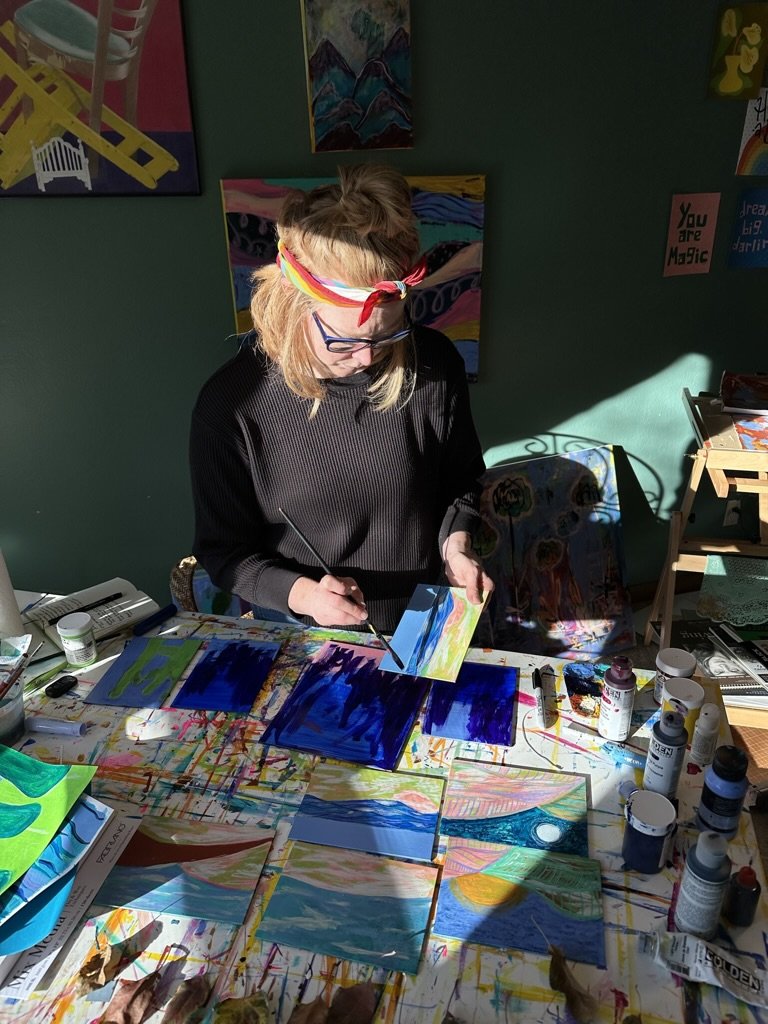Running a Business with Chronic Illness
(latte artist not always included!)
I’m very excited to introduce the first part of this new blog series, which is all about different aspects of navigating life with chronic illness.
One of my absolute favorite things is getting to hear people’s stories. Every journey is so unique and I love listening, beyond the facts themselves, to how people make meaning of their experiences.
I also deeply enjoy bringing people together, creating spaces where authentic connections can be made, ones that uplift and sustain through the challenges of life.
I’m very lucky that I have the opportunity to do both through my own business. In my 1-to-1 client work, I get to journey with folks learning how to manage complex and changing health conditions and how to stay compassionately connected to their bodies, relationships, and values through it all. With my Root to Rise program, we dive into pragmatic and embodied self-management approaches in small, supportive groups, where folks can connect with others who just get it.
Because I have witnessed how powerful telling and hearing stories can be, I have invited clients, colleagues, and friends to share theirs with you. This one focuses on the experience of being an entrepreneur and running a business with chronic illness.
Let me introduce you to the two lovely folks I had the pleasure of interviewing:
Elisha Ellis Madsen
Elisha is a board-certified music therapist and the owner of Feel Creative Wellness ("Feel" for short), a holistic music therapy private practice serving adults in the San Francisco Bay Area and virtually throughout the United States.
Julie Anne van Veenendaal
Julie Anne van Veenendaal is an Occupational Therapist and a BASI Certified Pilates Instructor from South Africa. Living with Postural Orthostatic Tachycardia Syndrome (POTS) led her to start her practice where she works primarily with people living with chronic conditions to support them in learning to live well with chronic conditions.
I hope you enjoy hearing a bit about their journeys and perhaps discover seeds of encouragement for your own!
Facing challenge and self-doubt
Julie Anne lives with postural orthostatic tachycardia syndrome (POTS), a condition marked by autonomic nervous system dysfunction with a variety of possible symptoms (more info from Dysautonomia International). As she pursued her graduate degree in occupational therapy, Julie Anne felt the impact of her condition on her participation in clinical training:
“The first time I really realised that my health could affect the work I wanted to do was in University at a practice learning placement in a burns ward. It was physically demanding and hot. The first week I passed out a couple of times in the ward and had more than a few naps on a treatment plinth.”
Even though she was passionate about and committed to her training, those experiences triggered feelings of self-doubt and worry. She says, “I remember having a good cry and wondering if Occupational Therapy was really for me.” In her first few years of practice after graduating, Julie Anne tried to make traditional OT roles work, but found herself unable to manage her symptoms well when constantly pushing through.
Elisha also experienced this conflict between the demands of typical clinical settings and what she realized she needed for her own wellness. Elisha was diagnosed with Chiari Malformation in 2014 and also lives with Ehlers Danlos Syndrome, POTS, gastroparesis, and Mast Cell Activation Syndrome. She shares,
“[I]t was hard to fit inside the boxes created for able-bodied people in the American work force. It's hard to ask for reasonable accommodations, and sometimes it's even harder to receive them!”
Author and activist Rebekah Taussig names what Julie Anne and Elisha are describing as the “Full-Time Working Adult system.” In her book Sitting Pretty, Rebekah writes that this system “measures our worth by an arbitrary amount of work that our bodies and minds are supposed to be able to produce within narrow parameters of time and space” (p. 132). It is harmful, unsustainable, and leaves little room for being human.
For both Elisha and Julie Anne, it became clear that struggling to fit into the traditional models of practice was not the best way forward. As Julie Anne states, “It has taken a long time for me to figure out ways to work with my health instead of trying to pretend that it isn’t a factor.”
Finding alignment and balance through self-employment
By starting their own businesses and being self-employed, Julie Anne and Elisha have been able to cultivate more balance in their lives and prioritize their own well-being.
“Self-employment has been much more supportive of my life with chronic conditions. It allows me to prioritize quality over quantity, to build my schedule around my needs and abilities, and to be open and honest with people about my needs,” Elisha shares.
Julie Anne echoes this sentiment: “I love that working for myself gives me freedom and flexibility when it comes to my schedule.” Furthermore, she points out that navigating her own health issues was not only the impetus for starting her business, but also for the focus of her current work. She says,
“I don't think I would have ended up working with people living with chronic illness if it wasn't for having POTS myself. I love that I get to provide the type of support I wish I had when I was struggling.”
Both of these women support other humans in truly meaningful ways: Elisha through music therapy; Julie Anne through movement-based occupational therapy. Coming alongside and journeying with other people in their struggles is an honor and it can be incredibly demanding.
To care for others in a sustainable way, we must care for ourselves well. We need to be able to stay connected to the practices that support our own physical, mental, emotional, and spiritual well-being.
Recognizing and releasing unhelpful narratives
Both Julie Anne and Elisha also recognize how important it has been to unlearn narratives along the way, especially those around productivity and rest.
“I believed that rest was earned through hard work, not inherently deserved.” Elisha notes how deeply ingrained those notions were and how much intentionality it took to uproot them (you can read more in her blog post here). She explains, “Now I believe that my self-worth is not dependent upon my productivity. I believe in everyone's right to rest.”
On her Instagram page, Elisha has a segment of posts called "Resting on Benches" to normalize and encourage taking time to prioritize rest. (She inspired me to join the trend!)
Julie Anne also points out that running a business does not automatically mean escaping productivity pressures since “there is a lot of noise in entrepreneurship that supports hustle culture and myths of infinite capacity.” The same unhealthy and unsustainable expectations from traditional workplaces are certainly thriving in some parts of the entrepreneur world. They can trigger all sorts of thoughts: Am I doing this right? Am I doing enough? Should I be doing more?
For those of us trying to grow heart- and human-centered businesses, it is so important to let our own values be our anchors. Julie Anne notes, “I constantly have to remind myself that I don't need to work traditional hours or be productive all the time.”
Another story Elisha chose to release was that living well with complex health conditions was not possible. She recalls,
“This started to change for me when I found both a mental health therapist and a holistic physical therapist who helped me learn to reconnect and restore trust with my body. I no longer see my body as the enemy.”
A specific piece of this letting go process was changing how she named and talked about her medical conditions: “I actually stopped using the words ‘chronically ill.’” Everyone makes meaning in their own unique ways and many folks find the language of “chronic illness” helpful in connecting to others with similar experiences. Elisha explains that she wanted to reclaim the complexity of her whole self (beyond underlying health conditions) and create room for healing.
“I started to realize that, for me, identifying as chronically ill created a story that I was always sick or always in pain, and that simply wasn't the case.”
Embracing support along the journey
None of us can do this journey through life alone. Independence, however captivating and/or patriotic it sounds, is a myth. Julie Anne shares,
“One of the reasons I was able to leave formal employment was because I have the support of my partner both financially and emotionally so that has probably been the biggest support, but I have also had wonderful support from other Occupational Therapists locally and internationally.”
She also had the opportunity to go through a formal coaching program, which gave her tailored approaches and the confidence to begin working for herself.
In navigating the management of her health conditions as well as the transition to private practice, Elisha reflects:
“I've been very lucky to have a supportive team around me, from a primary mental health therapist who specializes in somatic-based therapy (which I highly recommend for anyone reading this), a holistic physical therapist, my family and friends, and a healthcare team that I've built over the years.”
Imagining (and creating) a new way
Julie Anne shares, “I think the biggest lesson I have learnt and am still learning is that my path doesn't need to look like other people's paths.” It is so tempting to look around and compare ourselves to others. Choosing to live authentically is no small task, especially when doing so means making choices that go against the grain.
Of course, there will still be challenges along the way – but there will also be unexpected gifts. Elisha explains that, for her,
“Learning to manage multiple complex illnesses became an unexpected path of self-discovery, mindfulness, acceptance, and eventually an increased capacity for empathy and holding space for others' pain.”
I truly believe that every human is imagining and creating a new way forward – because none of us have lived this day, this life before! However, both entrepreneurship and managing chronic health conditions demand (or invite, depending on your perspective) particular creativity and willingness to let go of the idea that there is one right way to do it.
I so appreciate both Julie Anne and Elisha for taking the time to share their experiences and insights. I am especially thankful to have met both of them along the entrepreneur journey, which can be wild and lonely without such kindred spirits!
In closing, I’d like to share these words from Elisha: “Sometimes, the darkness can teach us who we are. Sometimes, the hard things lead to growth. Sometimes, if we are brave enough to ask for help, we will get it.”
What struck you about these stories? Where has your own journey taken you?
I’d love to hear from you! Email me here.
Lindsay Voorhees, OTR/L
Lindsay is an occupational therapist, wellness coach, certified yoga teacher and owner of Lindsay Voorhees Wellness. She supports clients in nourishing their own resilience and finding more freedom in their bodies and lives through empowering, evidence-based self-management and accessible, trauma-informed mind-body and movement practices.



















